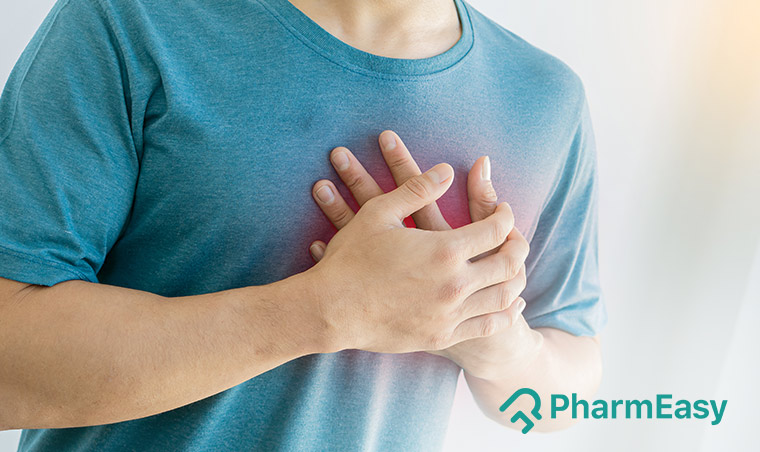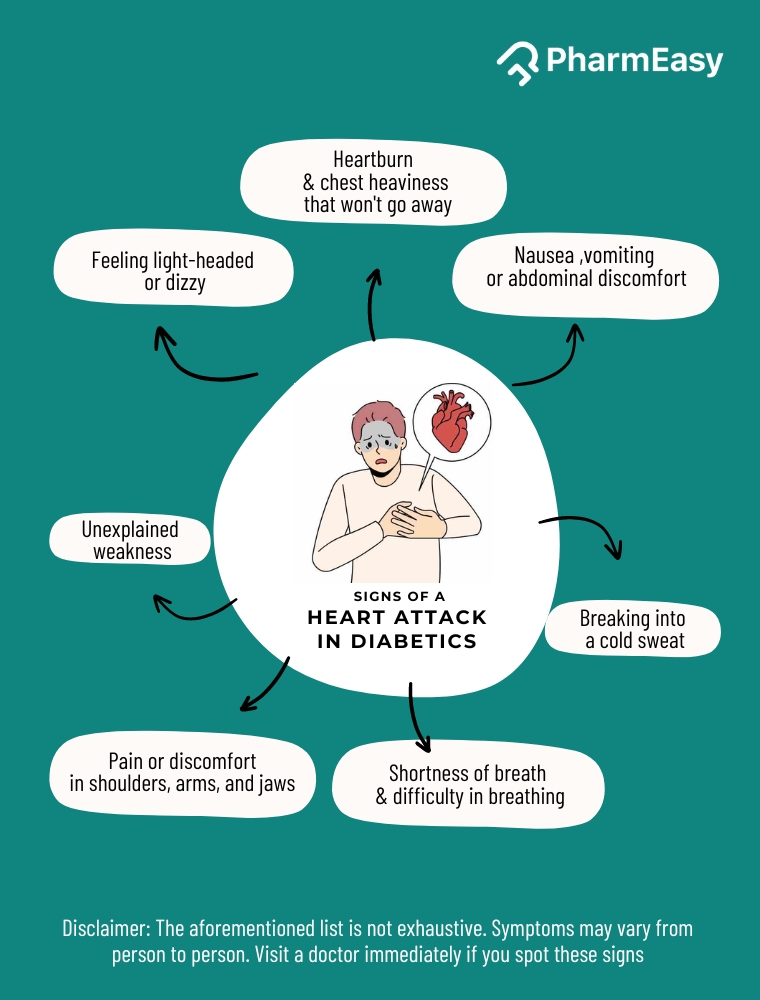You Could Have A Heart Attack And Not Even Know About It
By Dr. Nikita Toshi +2 more

Get,

to manage your symptom
Get your,


4 Cr+ families
benefitted

OTP sent to 9988776655



You’ve successfully subscribed to receive
doctor-approved tips on
Whatsapp

Get ready to feel your best.

Hi There,
Download the PharmEasy App now!!


Register to Avail the Offer
Send OTPBy continuing, you agree with our Privacy Policy and Terms and Conditions

Hi There,
Sign up on PharmEasy now!!
Trusted by 4 crore+ families

OTP sent to 9988776655



You have unlocked 25% off on medicines




Code: NU25
By Dr. Nikita Toshi +2 more
Table of Contents
When we think of heart attacks, an image pops up in our minds. A person experiencing searing pain in the chest and losing consciousness. While this does indeed happen, there is another phenomenon called a silent heart attack. Most people are not aware of this kind of heart attack. The silent heart attack is not accompanied by the usual signs of a heart attack. It is very much possible that the person experiencing the attack wouldn’t even realize that something is amiss. While this can happen to anyone, persons with diabetes are more prone to it.

If a heart attack can be painless, does that mean it is also harmless? Not at all. A silent heart attack will damage your heart health just like a regular heart attack. In the case of uncontrolled diabetes, due to the damage to nerves, your body fails to sense the pain and discomfort due to the heart attack. It might eventually even put your life at risk. In a way, a silent heart attack is more dangerous than the one that triggers pain. If you don’t even know that you’ve had a heart attack, you will not be able to seek medical help and your health could deteriorate without any warning.
It is also worth knowingthe difference between cardiac arrest and heart attack. Mostly, heart attacks occur when one of the arteries (blood vessels) leading to the heart gets blocked, while cardiac arrest is when the heart stops beating and the person stops breathing normally. Cardiac arrest is worse than a heart attack.
So what is to be done? Let’s find out!
Any heart attack, silent or otherwise, happens when your heart muscles do not get a steady supply of oxygen-rich blood through the arteries for a long period of time. The muscles need oxygen to stay healthy and carry out their tasks. But when plaque (caused by bad cholesterol) builds up in the arteries, these blood vessels lose their flexibility and the passage becomes narrow. Naturally, not enough blood is able to flow through them to the heart. The oxygen-starved heart muscles start dying and eventually, a heart attack happens which can further damage the heart muscles and other vital organs of the body.
A silent heart attack may not be characterized by sudden intolerable pain but it is a misconception to think that there are absolutely no warning signs. In the days preceding the attack, people do experience certain mild heart attack symptoms which most ignore. Recognizing these signs for what they are, the precursor to a heart attack can help you prevent one.

Any unusual feeling in your chest that persists for more than a day should be examined by a doctor. Heartburn can cause intense stabs of pain but this does not last for more than a few minutes. So do not ignore your chest discomfort by chalking it up to indigestion.
Other heart attack symptoms that need to be brought to your doctor’s attention are – mild pain in your chest, a feeling of pressure anywhere in this region or an inexplicable fullness. Do not overlook these signs of a heart attack.
A silent heart attack (or any other heart attack) may trigger pain anywhere in the body other than in the chest in the days leading up to the attack. It is difficult for people to associate body pain with an upcoming heart attack. If you feel constant pain in your arms, neck, abdomen, back or jaws, let your doctor know.
If you are having difficulty breathing or are feeling dizzy, the cause might be more than your asthma acting up or exhaustion. Impending heart attacks often trigger both these heart attack symptoms. Poor blood supply to the heart means that even minor exertions like walking up a flight of stairs can make you wheeze. Disorientation happens because your heart isn’t able to pump enough blood to the brain.
Nausea could be triggered by a variety of causes from indigestion to the flu. But a future heart attack is also sometimes preceded by intense nausea and vomiting. You may also break out into sudden cold sweats accompanied by dizziness. If you haven’t caught the flu or if there are no other signs of indigestion, then contact your doctor immediately.
No matter what your age is, you need to take better care of your heart. Exercising 5 days a week is a must. If you are a heart patient, discuss with your doctor about the right exercise for your body. A healthy diet can keep risk factors of heart disorders such as hypertension, high levels of LDL and obesity in check. Undergo cholesterol tests, monitor your blood pressure and give up smoking. Be especially careful if your family has a history of heart diseases. Most importantly, familiarize yourself with the tell-tale signs of a heart attack. If you experience any discomfort for an unusually long time, do not hesitate to inform a doctor. This will save your life.
Disclaimer: The information provided here is for educational/awareness purposes only and is not intended to be a substitute for medical treatment by a healthcare professional and should not be relied upon to diagnose or treat any medical condition. The reader should consult a registered medical practitioner to determine the appropriateness of the information and before consuming any medication. PharmEasy does not provide any guarantee or warranty (express or implied) regarding the accuracy, adequacy, completeness, legality, reliability or usefulness of the information; and disclaims any liability arising thereof.
Links and product recommendations in the information provided here are advertisements of third-party products available on the website. PharmEasy does not make any representation on the accuracy or suitability of such products/services. Advertisements do not influence the editorial decisions or content. The information in this blog is subject to change without notice. The authors and administrators reserve the right to modify, add, or remove content without notification. It is your responsibility to review this disclaimer regularly for any changes.

Leave your comment...
Comments